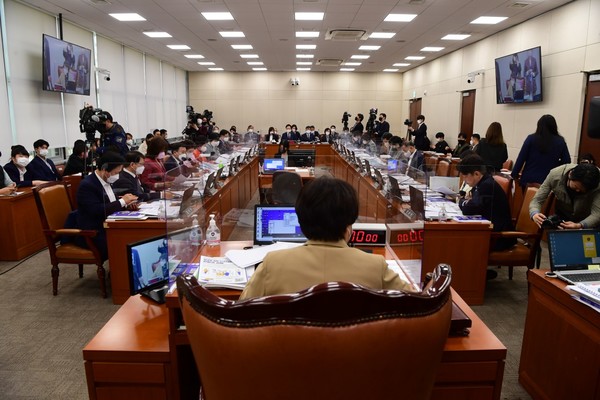Despite widespread expectations, the amendment bill to Medical Services Act aimed at allowing non-face-to-face treatment has failed to cross the threshold of the National Assembly Health and Welfare Committee’s subcommittee.
Industry insiders attributed the failure to lawmakers’ doubts about deciding medical fees for the non-contract treatment as well as pharmacists’ influence to block the direct delivery of drugs.

The Health-Welfare Committee decided Wednesday to continue discussions.
An official at the opposition Democratic Party of Korea (DPK) revealed the deliberation process to Korea Biomedical Review over the phone later in the day.
“Initially, the DPK was concerned about too rapid institutionalization of non-face-to-face treatment. Therefore, it told lawmakers to examine guidelines carefully before approving the bill,” the official said. “However, once the deliberation began, few legislators, even those in the ruling People Power Party (PPP) agreed to it. I could see government officials feel embarrassed.”
The official opined that the ministry focused too much on persuading the medical community and did not make corresponding efforts to persuade lawmakers. As the institutionalization of telemedicine was one of the government’s primary agenda items, as shown by the chief policymaker of PPP taking the initiative in its approval, the ministry was concerned about DPK’s refusal to cooperate, but the actual situation was different, he added.
The official attributed the failure to pharmacists’ influence.
There are many pharmacists-turned-lawmakers in the subcommittee, all of whom said nay, the official said, adding that a former head of the Korean Pharmaceutical Association visited the National Assembly on Tuesday to persuade lawmakers.
“In this process, the association’s concerns about direct drug delivery seemed to win legislator’s ears,” the official said. “Vice Minister of Health and Welfare Park Min-soo talked about the simultaneous implementation of non-contact treatment and direct drug delivery. However, that seems to have heightened a sense of crisis among pharmacists.”
Direct drug delivery was not the only factor behind the disapproval of the telemedicine bill. The issue of determining the insurance coverage level for the new service was put on the block.
“Both ruling and opposition camps raised the issue with why they give larger insurance benefits to non-face-to-face treatment than face-to-face medical service,” the official said. “Currently, higher insurance coverage is provided for non-contact treatment than face-to-face service to cope with Covid-19 more effectively because there are no other options. However, the lawmakers seemed to think they would not consider such things once the system is institutionalized.”
Some doctors, although they oppose the introduction of telemedicine, think they should receive 1.5 times higher reimbursement than face-to-face service once the non-contact treatment is institutionalized.
“However, most lawmakers said it preposterous,” the official said. “The health-welfare ministry said there was no need to discuss the matter immediately. However, ministry officials appeared embarrassed with the lawmaker’s reaction.”
The official predicted negatively about future discussions to institutionalize non-face-to-face treatment.
“The atmosphere in the conference room was not ‘let’s ripen the issue for a month or so,’” the official said. “I thought the lawmakers opposing the bill would not alter their stance even if discussion resumes after a month.”
“The DPK maintains a position that the time has come to discuss institutionalizing telemedicine and has drawn its outlines, such as limiting it to first-time treatment and neighborhood clinics while banning institutions exclusively providing such services,” the official said. “Under the current circumstance, however, we should first confirm whether the ruling party shares a similar opinion before resuming the discussion.”
Telemedicine industry seethes at the slow pace of institutionalization

The medical institutions and other related businesses that have prepared for the official introduction of telemedicine are stewing in silence. That’s because the government is strengthening standards, and even the National Assembly, which they thought as their ally, is hesitating to pass the bill.
“Frankly, we were anticipating the bill’s passage and thought it highly likely,” an executive at an intermediary platform provider said. “So, the disapproval is all the more disappointing.”
The executive said it might be because the industry was too complacent or some other factors might have worked, adding he felt at a loss for what to do.
Another industry executive expressed concerns about the nation’s backtracking on this issue and going back to pre-Covid-19 days.
Commenting on the criticism about the industry’s going excessively profit-oriented ways, the executive said. “Frankly, I don’t know that they want further from us. On the contrary, they want us to quit this business.”
“From the start, we tried to accept the medical community’s position positively and sought telemedicine’s status and possibility within the boundary of face-to-face treatment in principle,” the executive said. “Only the industry is running ahead of other sectors of society. We hope the government, parliament, and the medical community will look closely into treatment fields and listen to our voices.”
Related articles
- Is the institutionalization of telemedicine gaining momentum?
- Nearly 14 million Koreans used telemedicine in Covid-19 period
- How should Korea deal with rapidly growing digital therapy device industry?
- ‘All G7 nations allow telemedicine for new patients? Not true.’
- Share of first-time treatment remains only 9% of telemedicine
- Dermatology records highest first-time treatment rate of 26% in temporary telemedicine
- Telemedicine industry calls for overhauling government’s pilot program

